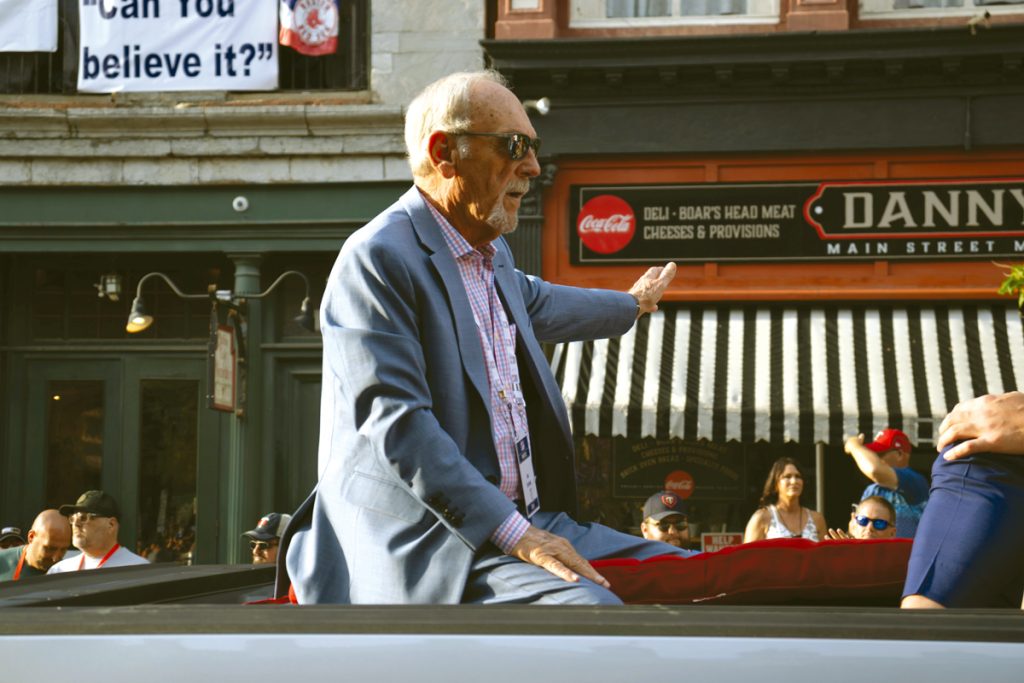
Long-time Manager Leyland Steals the Show at 2024 Induction
By CHARLIE VASCELLARO
COOPERSTOWN
In a separate category from the other three members of the 2024 Hall of Fame Induction class, 22-year major league manager of four different teams Jim Leyland was elected by the Contemporary Era Committee for Managers, Executives, and Umpires, while fellow inductees Adrian Beltré, Joe Mauer and Todd Helton, all players, were elected on the regular Baseball Writers’ Association of America ballot.
Widely respected and acknowledged as one of the best of his era, and all-time, Leyland won three Manager of the Year awards (1990 and 1992 with the Pittsburgh Pirates and 2006 for the Detroit Tigers), six division titles (1990-1992, with Pittsburgh and 2010-2013, with Detroit), three league pennants (1997 Florida Marlins, 2006 and 2012 in Detroit) and one World Series title with the 1997 Marlins. His 1,769 wins rank 18th all-time, sandwiched between Lou Piniella, 1,835, and Buck Showalter, 1,727, neither of whom has yet gained election to the hall. He also came out of retirement to lead Team USA to a World Baseball Classic title in 2017. His Hall of Fame plaque does not contain the logo of any team in his cap.
Shortly after stepping to the podium to deliver his acceptance speech, Leyland dropped the best one-liner of the day in front of an estimated crowd of 28,000 at the Clark Sports Center on Sunday, July 21. After introducing the members of his family—wife Katie, son Patrick and daughter Kelly, seated in the front row—Leyland shared a recent anecdote with the crowd.
“I was having coffee with Katie a couple of weeks after I was elected to the Hall of Fame and I casually said, ‘Katie, can you believe in your wildest dreams that I’ve been elected to the Hall of Fame?’ and Katie replied, ‘Jim you’re not in my wildest dreams.’”
The crowd responded with its loudest guffaws of the afternoon.
With a dry, acerbic and sarcastic wit, Leyland continued to deliver a heartfelt, emotional and oftentimes hilarious 13-minute speech.
“My contributions to our beautiful pastime pale in comparison to the joy it has brought to my life, from the heart of a little boy to the soul of an old man,” said Leyland, adding, “I’d like to thank every player that played for me in the minors and the majors because I’m here today because of you and the four organizations that gave me the opportunity to manage their major league team.”
In a chronological narrative, Leyland began by telling the story of his minor league playing days.
“Shortly after high school I signed a pro contract with the Detroit Tigers. The scout that signed me was named Harmon Candor and I think he was fired 24 hours after he gave me the contract,” said Leyland, eliciting another round of laughter from the audience.
Leyland began an 11-year managerial run in the minor leagues for the Detroit Tigers Rookie League team in Bristol, Virginia.
“Managing in the minors can be tough, because you have to release players and shatter their dreams of ever becoming a big leaguer, and I knew that because I was one of them. On the other side of that spectrum, it is so rewarding, because you get the chance to tell a player he’s going to the big leagues. Such was the case with Jack Morris when I got to deliver the great news. He went on to become one of baseball’s best big-game pitchers and is seated behind me here today at the Hall of Fame.”
Leyland continued to describe the arc of his career, including being hired in 1982 by owner Jerry Reinsdorf, general manager Roland Hemond and Hall of Fame manager Tony La Russa to coach third base for the Chicago White Sox, which Leyland referred to as the springboard to his managerial career.
In 1985, Leyland was hired by Pittsburgh Pirates General Manager Syd Thrift to manage the Pittsburgh Pirates, a post he occupied for 11 years.
“It never felt like manager and fans in Pittsburgh,” said Leyland in a cracking tearful voice. “It felt more like manager and friends. I know we made you happy and I know we broke your heart, but I always felt like we were in it together.”
Leyland enjoyed his greatest success during his brief two-year stint as manager for the Florida Marlins (1997-1998), winning his only World Series in 1999, and moved on to the Colorado Rockies for one abysmal season in 1999, where he managed Hall of Famers Larry Walker and current inductee Todd Helton.
After a six-year managerial hiatus, Leyland assumed the skipper’s position in Detroit.
“Signing some 40 years before with the Tigers, I finally got to Detroit in 2006. It took a long time,” said Leyland.
Leyland compiled a 700-597 record in eight seasons with Detroit, capturing two American League pennants in 2006 and 2012, and retired after the 2013 season.
He was called out of retirement by Hall of Fame manager and Major League Baseball Chief Baseball Officer Joe Torre to manage Team USA in the 2017 World Baseball Classic.
“I never saw a group of guys grow so close in such a short period of time,” said Leyland, again breaking into tears, “and we went on to win that World Baseball Classic for the United States.”
In closing, Leyland mentioned people who work in baseball that “never get thanked enough,” including, “front office trainers, team doctors, strength coaches, traveling secretaries, clubhouse managers, PR directors and scouts, and in every place I was I felt I had the best. Also thanks to broadcasters, the media and the men in blue; the umpires, and of course the coaches, one of the most important elements of any organization, the coaches,” said Leyland, adding that he wished he could thank all of the coaches.
He did single out his friend and roommate, Gene Lamont, which also elicited an emotional response.
“It was unbelievable to have your closest friend standing next to you in the dugout through the good times and the tough times,” said Leyland, asking Lamont, who was in attendance, to stand up.
While still crying, Leyland said in closing that he would like to thank the fans.
“No matter which Hall of Famer you’re here to support today or what team you cheer for, your presence is always felt. On your feet in the ninth with the home team clinging to a one-run lead. Turning on your television for the first game of the World Series and seeing 50,000 fans waving towels hoping and praying that this may be their year. Or a little boy or a girl getting their first autograph and scurrying back to the stands to show mom and dad their latest treasure. Ladies and gentlemen, that’s you and that’s baseball and this is the Hall of Fame. Thank you so much.”
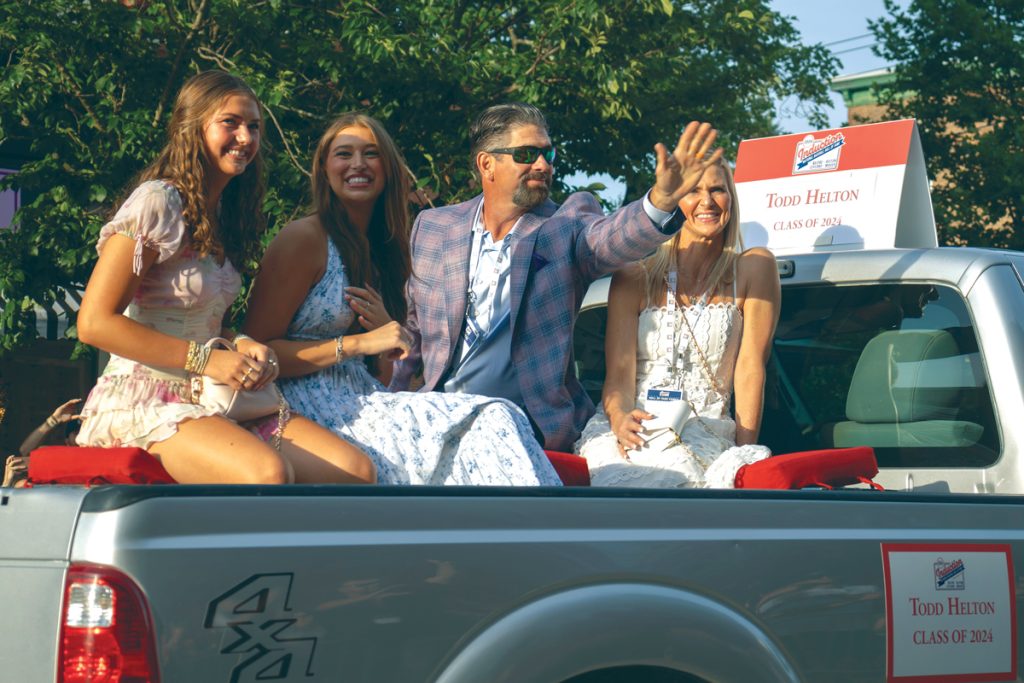
Humble Helton
Earning election in his sixth year on the ballot, with 79.7 percent and 307 votes, first baseman Todd Helton spent his entire 17-year career playing home games at Coors Field in Denver for the Colorado Rockies.
At the top of the Rockies career batting leader boards, in the words of teammate and fellow Hall of Famer Larry Walker, Helton is “The greatest Rockie of them all and the first player to enter the Hall of Fame with a Rockies cap on his plaque.”
The text on his Hall of Fame plaque reads as follows:
One of baseball’s most efficient hitters, who blended plate discipline with elite contact skills and brute strength during 17-year career as face of Rockies franchise. Across five consecutive all-star seasons from 2000-2004, led the majors in batting average (.349), extra-base hits (451) and total bases (1,832). His 2000 campaign topped leaderboards with 59 doubles, 147 RBIs, a .372 average and a 1.162 OPS and was his first of back-to-back seasons with more than 400 total bases. Left-hander earned four Silver Slugger awards and three Gold Gloves, leading NL first basemen in fielding percentage six times.
The only knock against Helton, and explanation for why he was not elected sooner, is that he played his home games at hitter-friendly Coors Field.
In the opening remarks of his speech, Helton alluded to the Coors Field factor, thanking former Rockies teammate and Hall of Famer Larry Walker “for taking care of me early in my career and paving the way for me to be here.”
In a very subdued speech, Helton expressed his appreciation and perhaps surprise for receiving baseball’s highest honor.
“Those of you who know me, know I’d be more comfortable doing anything other than standing here talking about myself. I’m just a ballplayer, anyone in the media can attest to that fact. So, with that in mind, thank you to the media for making the most of what little I gave you…To say I’m humbled by this honor does not begin to cover how I feel standing here today.”
Helton acknowledged his fellow 2024 inductees and singled out Leyland who, in his only year managing the Rockies in 1999, told Helton, “If you keep playing like this, you’re going to make it to the Hall of Fame.”
Spending his entire career with one team, Helton thanked all 411 of his teammates (not by name) during his 17-year career and added that, “If you were invited here today, you played a role in me being here.”
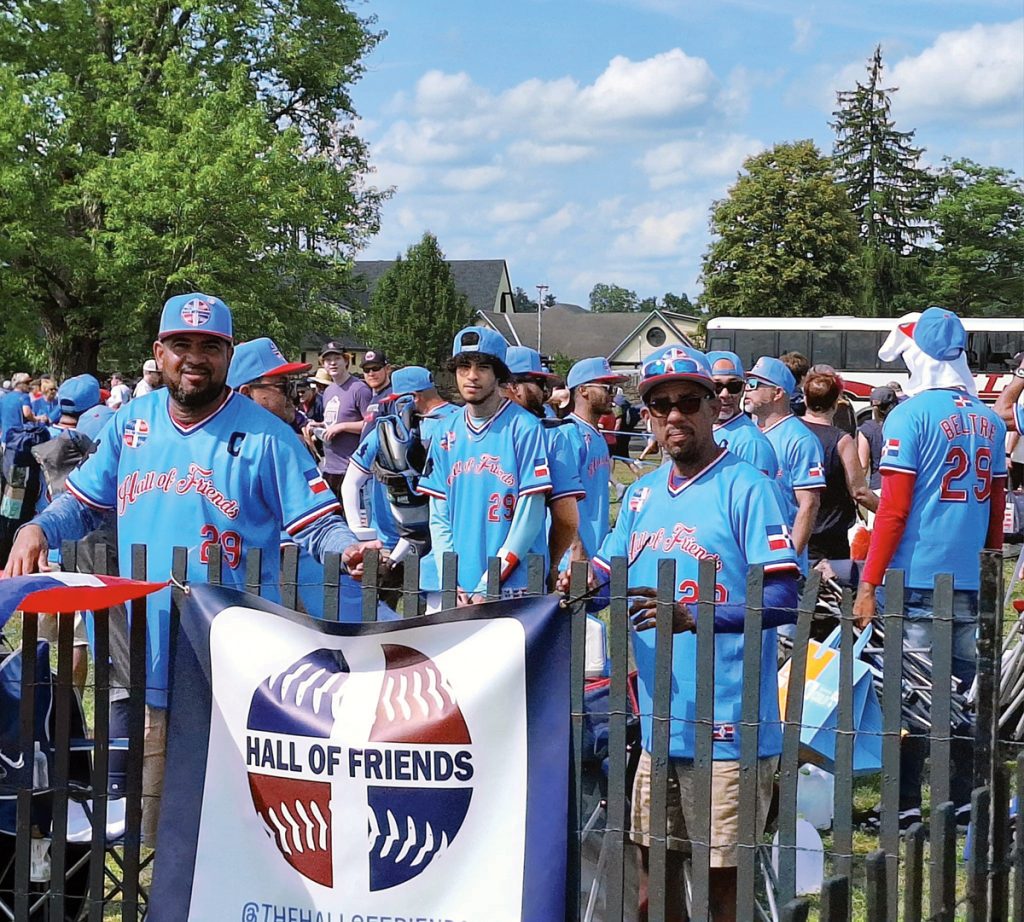
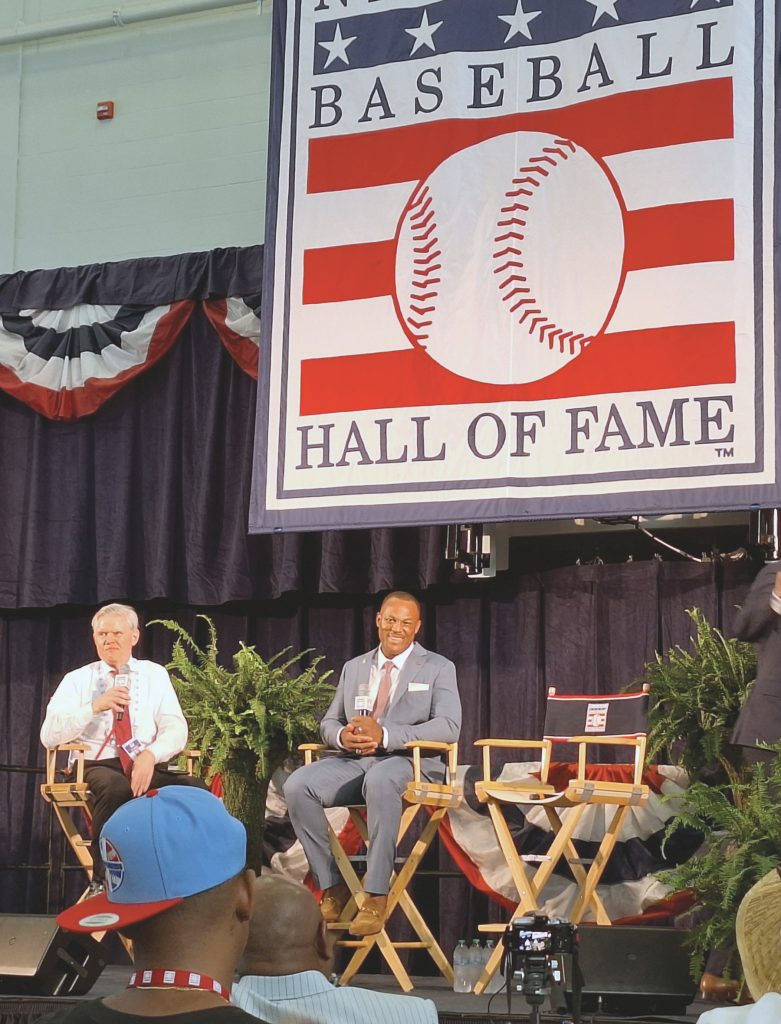
Boisterous Beltré
Perhaps slightly overlooked during his playing career, upon his enshrinement to the Hall of Fame a case can be made that Adrian Beltré may be the greatest third baseman of them all. In his first year of eligibility, Beltré was named on 95.1 percent of the ballots, the same number reached by Babe Ruth and Ty Cobb in the years that they were elected.
The only third baseman to reach 450 home runs and 3,000 hits, Beltré’s 3,166 career hits ranks 18th all-time and are the most by a third baseman.
The text on his Hall of Fame plaque reads as follows:
Combined formidable bat with dynamic defense to establish himself as a premier third baseman. The first to record both 450 home runs and 3,000 hits. Dominican Republic native developed with Dodgers into baseball’s top home run hitter with 48 in 2004. Closed career with eight-year run as Rangers lineup centerpiece, reaching the 30 home run mark three more times and leading the majors in hits in 2013. Filled highlight reels across 21-year career with quick hands and a rifle arm, winning five Gold Glove Awards. Four-time All-Star retired with more hits than any other third baseman.
Beltré appeared to be having fun on the Hall of Fame stage even when he was taken by surprise when Hall of Famer David Ortiz got up from his chair to sneak up on Beltré and rub his head, a practice Beltré was famously known to abhor. In a post induction press conference, Beltré was asked if the Ortiz head rubbing helped to relax him before his speech.
“It didn’t relax me. It never relaxed me. But I’m open to people to be able to have some fun with me,” said Beltre.
Fun was a running theme during Beltré’s speech.
“I loved it. I love baseball. I had so much fun playing the game,” said Beltré.
Beltré is the fifth Dominican-born player to reach the Hall of Fame, following in the footsteps of Juan Marichal, Pedro Martinez, Vladimir Guerrero and David Ortiz.
Toward the end of his speech, Beltré expressed appreciation for the opportunity he was afforded to play in the major leagues in the U.S.A.
“Thank you to this great nation for allowing me to fulfill my dreams.”
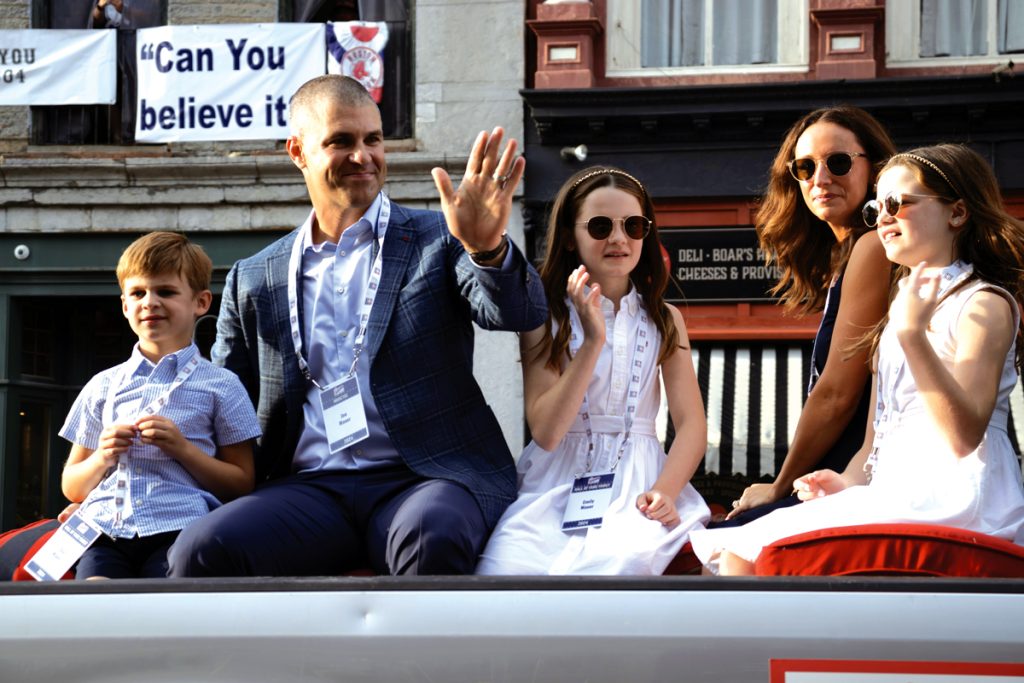
Minnesota’s Mauer
Like Helton with the Rockies, catcher Joe Mauer was a one-team wonder, spending his entire 15-year career with the Minnesota Twins. But Mauer didn’t just spend his career in Minnesota, the St. Paul native has spent his entire life there and perhaps no Twins players has identified as strongly with the city and its fans.
In his opening remarks, Mauer addressed his roots, Minnesota bloodlines and baseball connections to his home state.
“I grew up in St. Paul, Minnesota with my parents, two older brothers and my grandpa, Jake Mauer. Much of my early childhood was spent watching Twins games and pretending to be a big leaguer in my back yard and at various neighborhood parks with my brothers. Many of those parks were the same fields that fellow Hall of Famers Dave Winfield, Paul Molitor and Jack Morris played on as well. How lucky and unique it was to have three big leaguers and future role models hail from my same city. Watching them as a kid was my first glimpse of hope that maybe I could make it in baseball as well. It will never be lost on me that the same guys I pretended to be in my yard are men I grew up to know personally, and I even had one of them become my manager,” said Mauer.
Although Winfield and Molitor were not in attendance, other former Twins seated on the stage behind Mauer for the ceremony included Tony Oliva, Jim Kaat, Jim Thome and Morris. All of the former Twins introductions were met with a raucous response from the large contingent of Twins fans in attendance.
A six-time All-Star, five-time Silver Slugger Award winner and three-time Gold Glove Award recipient, Mauer is the only catcher to win three batting titles and the only American League catcher to capture a batting crown, doing so hitting .347 in 2006, .328 in 2008, and a career-high .365 in his MVP season of 2009. Mauer is the only catcher to reach 2,000 hits, with a career batting average higher than .300 (.306) and an on-base percentage above .380 (.388).
With his induction Mauer, 41, is the youngest member of the Hall of Fame, with fellow inductee Beltré the next youngest at 45.
Most of Mauer’s narrative was focused on his family, running from the beginning to the end of his speech.
“Long before my big-league days, my parents coached all of our little league teams throughout the years. Rides to and from games consisted of conversations on good sportsmanship and ways to improve. And our dinner table talks were more of the same. At our home, baseball was a family affair,” said Mauer, whose “Twin” daughters were also in tow.
“Maren and Emily, you two gals mean the world to me. You’ve always been my little cheerleaders, and no matter the outcome of the game, you always seem to put a smile on my face. You’ve helped me see things with a new perspective and are a constant reminder of what’s truly important in this world,” Mauer said.
In the post-ceremony press conference, Mauer acknowledged the presence of his home-state homies:
“It hit me at the parade, seeing all of the Twins fans. It’s not easy to get to Cooperstown.”

